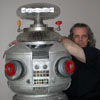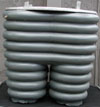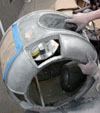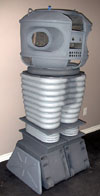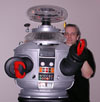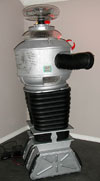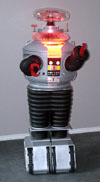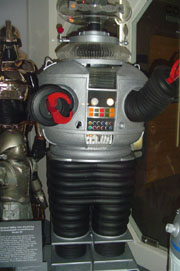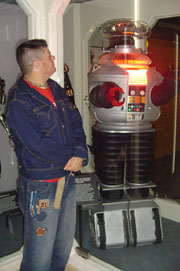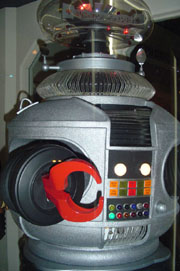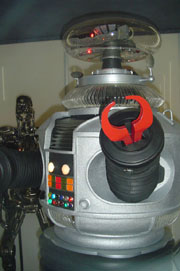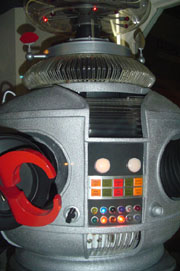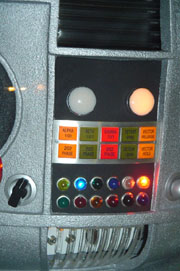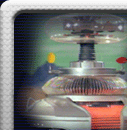



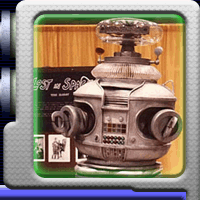
 |
|
| Club Gallery ->Stunt Robot | |||||||||||||||||||||
The "Stunt Robot", by Frederick Hodges The so-called "stunt robot," which was actually called "the dummy robot" in all production materials, was constructed in May 1967 in preparation for the first episode of the third season "Condemned of Space," which marked its screen debut. All "stunts" seen in the 1st or 2nd season were performed by the "hero." Although the history of the dummy robot is much longer and more interesting than I can go into here, I can state that the original reason for building the dummy robot was to produce a light-weight robot that could be safely suspended from wires for the scenes of the episode in which the robot is floating in space. Originally, they were going to use the "hero" robot, but he was just too heavy to suspend. They then came up with the idea of using the upper half of the "hero" robot and creating a light weight bottom half in order to eliminate the weight of the steel tread section. This was a good idea, but it did not reduce the weight enough. Thus, of necessity, the idea of a super light weight complete dummy robot was born. Also, it was originally planned to have Bob May inside the suit operating the arms and neon, but for liability and safety reasons, this plan was abandoned. I have unearthed no evidence that parts from one robot were ever used with the other robot for any reason. Frederick H.
The Fred Barton Stunt Robot Restoration for Paul Allen. Fred Barton sent these photos to show us the work that he did to prepare the remains of the Stunt Robot for public display. Before
During
After
Other
robots at the
Seattle
Science Fiction Museum and Hall of Fame.
Fred's description of the restoration process: My
Fellow B9'ers... Here is my take on the Stunt Restoration... Should anybody care. My Philosophy of Restoration There are several schools of thought on restoration. The philosophies range drastically, and the effect on value and lifespan of your prop is paramount. Knowing your personality, knowing your financial situation and your goals, understanding the fundamentals of aging and altered props is key to success when making your restoration decision. The jury is still out on the schools of Philosophy - NOBODY is the end all of authority. The owner of a piece chooses its destiny, and integrates his personality into its history through the entire tenure of their possession. This integration may increase or decrease its value in a subjective world of appraisals. Remember, the decisions are personal, and should never be second-guessed. Make educated choices, and enjoy your movie-prop. Schools of Thought: The first school; do nothing, accept the piece as it appears no matter how poor the condition. Let it rot and disintegrate so no man can ever study or enjoy the piece or spirit of the piece for generations to come. Own it to death. The second school; with skillful restoration return your prop to a state of screen used likeness and have practical display use within your home, maintaining a good percentage of its appraised value. Props of fair to poor value are in most cases savable. - Maybe (No Latex) With proper conservation, these pieces maintain a good portion of their pseudo value, and are no longer an eyesore or a foolish sad machine. The third school; strip it bare, sand it down, and fix it any way you can to make it look new and functional again.
For the record, a lot of props were completely restored for that museum, like the My Favorite Martian ship, the Blade Runner car, on and on. Now here's more of the deal. People seem to think that stunt was the most original robot, which survived when the series was cancelled. Well, yes and no. Technically speaking, only the main body parts survived, which included the bubble, cardboard brain, wooden bubble lifter, wooden radar and wooden ear posts, collar, torso, decaying foam donut, wooden waist plate, fiberglass bellow, fiberglass knees, wooden knees plates, wood and cardboard pedestals and cardboard wheels and decaying foam treads. All authentic pieces made by Fox and great for reference. (Throw away your blue prints) Now, when Greg Jein bought the robot and J2 at a Fox auction, it was a total wreck as seen in those pictures. He did the first restoration, just to make it presentable. So, right off, it was no longer "What we saw in the show". It was changed to look more presentable. IT WAS TOUCHED!!! And not with authentic Fox 60's era parts, but with 80's prop man best guess pieces. So we are well on the road to not being so f'n original already. Plus, Greg toured the thing around the world to Japan and who knows where else, where it further got changed and damaged. It was actually missing in shipping for over a year and turned up at a Hollywood curio shop where I tried to buy it, not knowing it was Greg's. I offered the guy 7K for it, but they thought they would rent it out- but never did. Greg found out where it was sued to get it back, and he did. At this time, he did more work to it, molded it and gave a lot of his prop making buddies these molds to make their own B9. The who's who in effects were making B9's like biscuits. Not to resell, just for themselves. Anyway, Greg put in heart box detail from hell, covered over the cardboard brain with tape painted it silver and put on alien markings. And painted the body and bellows and finally left it alone. -- Until the accident. A heavy light stand fell over and smashed the front of the torso, taking out the mouth and some of the side. Forever changing its profile. It was repaired poorly and went on its way again until it went up for auction and you know the rest. So, tell me, fellow B9'ers, what is so terrible in replacing the lost, stolen, missing and unauthentic detail with what Bob Kinoshita intended for Blinky to have? As a matter of fact, at his 90th birthday bash with the original Robby in attendance, and where I met Fred Hodges (he's so smart and young looking, isn't he?) and other intrepid builders from the club, I told Kinoshita that I restored the stunt robot and he was elated. He never thought that the stunt should have been so poorly made and was disappointed what has happened to it. He thanked me and thought I did a great job. HE also told me it was just a job and it was just a prop - AMEN!!! So if B9's creator approves... it should be good enough for you salty dogs. It was for me. Let
me tell you a bit about the stunt robot when I got it. It could
barely stand on its own. IT was listing to one side. The fiberglass
jell-coat was thin as tissue paper and cracking everywhere. All
the foam disintegrated, it was a mass of wires and shit. I shot
20 billion 6 MB Tiffs of it and then tore him apart with my bare
hands. Which wasn't hard. He flaked about like a buttery croissant.
I sanded and bondo'd that thing like a Ferrari for two months, replaced
entire sections of the torso, which were impossible to repair. Greg
had poured large amounts of resin to hold the thing together. This
is what is original on the piece today: The same surviving pieces as it left Fox. Only now, they have a new lease on life. I just put on more authentic pieces, as opposed to what the previous owner put on and gave him a new paint job. Well, more than just a paint job. I also motorized the spinners, put in an articulated brain, made him talk and light up. He is really a joy to see. And if some of you can get past his past and onto his future for generations to come, you will see that what I did was for the best. They were going to store him and never display him until I told them what I could do for it. This way at least we can all see and enjoy him. Plus, I made him as accurate as I possibly could. Way more authentic than the Hero restoration. I could have made him into a pleasure vehicle. I still might...JUST YOU WAIT!!! By the way, I also made Paul Allen an R2, a T2, a Robby, a Gort, a Maria a C-57D and a Martian War Machine. All on display. There is a ton of info about the restoration that I won't get into now; I have to get to work on some Robby's. If you guys have questions, I'd be happy to answer everything here on the site. I learned a lot about B9, that even me, THE ROBOTMAN didn't know. Fred Barton
Fred's description of the materials used in the Stunt Robot: From what I was able to observe when I had the stunt robot here for restoration: The
torso was fiberglass with wooden supports. When I got the thing, someone had added big wooden planks at the bottom of the feet for stability. The pegs were gone. Also more wood supports were added in the front and a 3/4" piece of plywood was put in between the tractors and they were screwed together. I also think the neon's were from the Hero, transplanted into the Stunt. I believe the stunt never had neon's, but rather fiberglass cross pieces of plastic or curved fiberglass with a plastic piece behind them and a light. Watch Anti-matter man closely when Don and Smith pick him up. Look at the neon area.
Chris Krieg took these photos of the restored Stunt Robot. (July 2004) This Robot
is currently part of "The Paul Allen Family Collection"
and is on display at the Seattle
Science Fiction Museum and Hall of Fame. To get an idea of the restoration required, take a look at the photos at the bottom of this page! Notice that some of the parts on the Restored Stunt Robot seem to have come from club vendors, cool!
The Long Distance "Stunt" prop, before restoration.
|
|||||||||||||||||||||


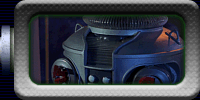





 The
Stunt Robot
The
Stunt Robot
